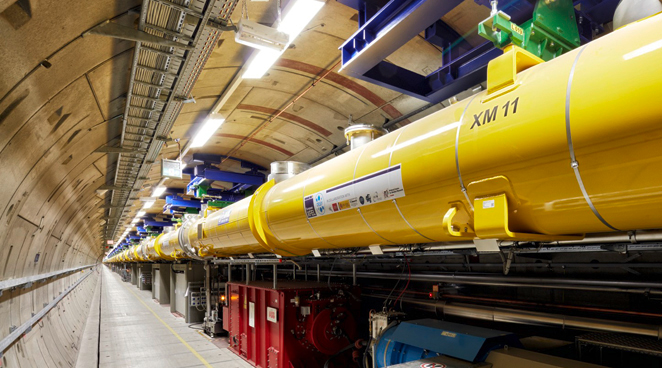 The European XFEL, the future European free electron super-microscope, successfully completed one of the last stages of its construction: the first beam of electrons was accelerated along the entire length of the machine, of 2.1 km. The first superconducting linear accelerator in the world of this size has hence started functioning: this is a crucial step for the commencement of the scientific activities, scheduled for next Autumn, when in the laboratories of the European XFEL in Hamburg, Germany, it will be possible to photograph and film, with atomic resolution, the biological, chemical and matter processes, both in the condensed and in the excited state of plasma. The European XFEL is, in fact, a project for the creation of a fourth generation synchrotron radiation source, based on the FEL (Free Electron Laser) process. That’s the result of a scientific collaboration, led by DESY (Deutsches Elektronen-Synchrotron) and in which Italy, with INFN, is one of the leading international partners. The accelerator that is now operative will feed the X-ray laser and is therefore the key-component system, for a total length of 3.4 km, of what will be the free electron super-microscope. INFN has made an
The European XFEL, the future European free electron super-microscope, successfully completed one of the last stages of its construction: the first beam of electrons was accelerated along the entire length of the machine, of 2.1 km. The first superconducting linear accelerator in the world of this size has hence started functioning: this is a crucial step for the commencement of the scientific activities, scheduled for next Autumn, when in the laboratories of the European XFEL in Hamburg, Germany, it will be possible to photograph and film, with atomic resolution, the biological, chemical and matter processes, both in the condensed and in the excited state of plasma. The European XFEL is, in fact, a project for the creation of a fourth generation synchrotron radiation source, based on the FEL (Free Electron Laser) process. That’s the result of a scientific collaboration, led by DESY (Deutsches Elektronen-Synchrotron) and in which Italy, with INFN, is one of the leading international partners. The accelerator that is now operative will feed the X-ray laser and is therefore the key-component system, for a total length of 3.4 km, of what will be the free electron super-microscope. INFN has made an
essential contribution to the accelerator’s creation, by developing, at the LASA laboratories in Milan, some of the key elements of the machine. The Italian contribution, of roughly 40 million Euro, funded by the Italian Ministry of University and Research (MIUR) and brokered by the INFN, yielded an almost
double return for the domestic industry, in terms of orders for advanced technologies. In addition, 10% of the researchers and engineers hired by European XFEL is Italian. Scientists at the European
XFEL have crowned their twenty-year commitment to the development and construction of one of the largest and most ambitious European research infrastructures, with a cost of over 1.2 billion Euro. Indicated as one of the most important projects in the roadmap of ESFRI (European Strategy Forum on Research Infrastructures), the European XFEL will put Europe at the international forefront, opening new paths for the development of fundamental scientific knowledge and their applications in biology, medicine, and new materials.






